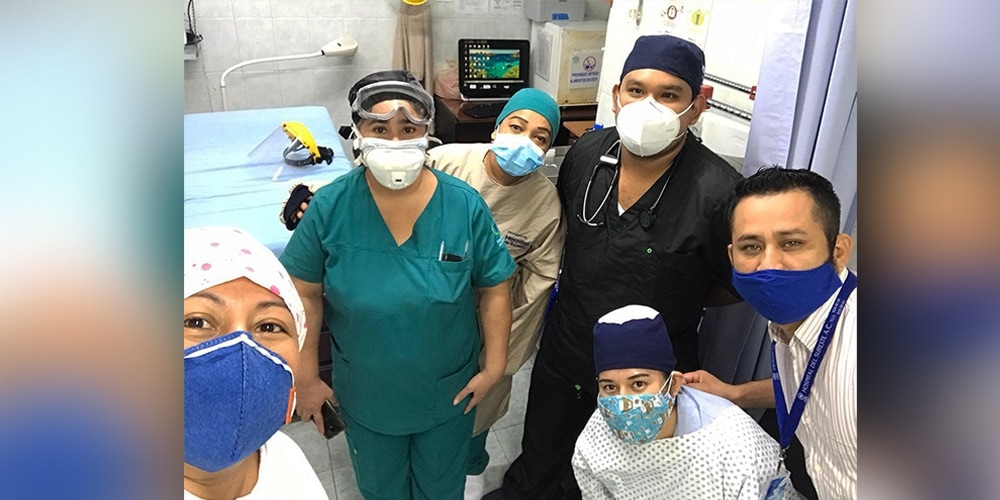
When employees at the Southeast Hospital, an Adventist health-care institution in Villahermosa, Tabasco, Mexico, began testing positive for COVID-19, management had to tighten operational procedures to flatten the curve and somehow continue to provide non-COVID medical care to a community hit hard by the pandemic.
“Our state of Tabasco kept moving between the fifth and third places at the national level with the number of positive cases of COVID-19, and for us, it meant 23 percent of our staff were affected,” hospital administrator Alexis Pérez said.
Rise of COVID-19 Cases
As of September 15, 2020, more than 28,800 positive cases and 2,620 deaths have been reported in Tabasco.
Forty-eight employees, including Perez and Robert González, the financial director of the hospital, had to be quarantined for three weeks or more between early April and August, according to Pérez. “Our hospital had never faced such a challenge, where we had to move fast to protect all employees and patients coming in,” Pérez said.
The hospital, classified as a facility that does not treat COVID-19 cases, has a triage area to screen for COVID-19 symptoms. Patients with such symptoms are sent home to rest or directed to one of the appropriate medical centers for treatment.
Something had to be done to protect the dozens of hospital staff while regular visits and surgeries decreased in the months of lockdown that began in April. New patients sent by overwhelmed hospitals began to seek regular medical services at the Southeast Hospital, needing additional coordination, Pérez said.
Studying the Reasons and Moving Ahead
“We sat down to document and analyze the positive cases in our hospital. We concluded that many of the infections took place outside the institution, in the general activities with friends or family members,” Pérez explained. The hospital moved into increased preventive measures, including the washing of hands, sanitizing areas, and the correct use of personal protective gear for each hospital department.
Initial fear of the pandemic reduced the number of surgeries that the hospital usually performs, Pérez said. On average, the hospital sees approximately 1,800 in-patient cases and 7,000 outpatient cases in urgent care every year.
Employees were switched to fewer workdays of 12-hour shifts, so they would not have to use public transit in the early hours of the morning and early evening every day. Within five months, 379 patients had gone through the special triage set up at the hospital, and none of the 208 hospital staff and employees lost their jobs through those most challenging months, Pérez said.
Authorities fear another COVID-19 wave, but patients still need healing and care, Pérez said. “Our task is to continue in the mission of offering a wholistic health service that restores the image of God in our fellow men, as our mission statement reads.”
In the 20 years he has been working in the Adventist educational and health-care systems, Pérez said he has never seen such a challenge and opportunity to better manage a health-care institution. He is in his third year as administrator of the hospital.
When he was recovering at home for three weeks with COVID-19 symptoms, Perez continued to hold meetings by phone.
Trusting God During the Crisis
“I began to serve the church right here in this hospital 20 years ago as an accountant,” Perez said. “And I feel a sense of commitment and love toward God and this hospital as I’ve seen it grow throughout the years.
“We are thankful none of the hospital employees were severely affected by COVID-19. Some still deal with the effects of the virus, but there are currently no employees with COVID-19. Our last affected employee tested negative this week and is back at work.”
“What’s most important in this crisis is to trust in God and value our human resources, who keep providing the health-care service that every patient needs,” Pérez said.
As a result of the extra preventive and safety measures, costs for services have risen as the process of patient care has multiplied. Still, it’s not about keeping a business afloat so much as sticking to the mission of serving every patient with Christian love, Pérez added.
The hospital continues to maintain a close relationship with the state health authorities in a collaborative effort with local hospitals and more, Pérez said. “We are on alert in case there is a resurgence of COVID-19 cases in the city and feel better prepared to deal with the challenges that it may bring.”
The original version of this story was posted on the Inter-American Division news site.